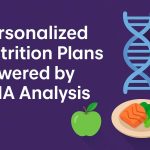In today’s fast-paced world, nutrition is no longer one-size-fits-all. What works for one person might not work for another — and that’s where DNA-based personalized nutrition is transforming how we eat, live, and take care of our health. As we move into 2026, advances in genetic testing, AI-driven health apps, and precision nutrition are empowering people to create customized diet plans based on their unique DNA profiles.
Let’s explore how DNA analysis is shaping the future of healthy eating and how it can help you reach your wellness goals faster and smarter.
🧬 What Is DNA-Based Personalized Nutrition?
Personalized nutrition uses your genetic makeup to determine how your body responds to specific foods, nutrients, and dietary patterns. Every human has small variations in their genes that affect metabolism, fat storage, vitamin absorption, and even how caffeine or sugar impacts energy levels.
With a simple saliva or cheek swab test, your DNA can reveal insights such as:
- How efficiently your body metabolizes carbohydrates, fats, and proteins
- Your vitamin and mineral absorption efficiency
- Food sensitivities and intolerances
- Genetic risk factors for obesity, diabetes, or heart disease
- Ideal macronutrient ratios for sustained energy
This data allows nutritionists and AI platforms to build DNA-personalized diet plans that align with your body’s unique biology — maximizing health benefits while minimizing guesswork.
🍎 The Science Behind DNA Nutrition
The science of nutrigenomics — the study of how genes and nutrients interact — is the foundation of personalized nutrition. Researchers have discovered that gene variations called single nucleotide polymorphisms (SNPs) influence how the body processes nutrients.
For example:
- The FTO gene can affect how your body stores fat.
- The MTHFR gene impacts how your body uses folate and vitamin B12.
- The CYP1A2 gene determines how quickly you metabolize caffeine.
Understanding these variations helps experts recommend specific dietary choices. Someone with a slower caffeine metabolism, for instance, might be advised to avoid excess coffee to prevent increased stress hormones or disrupted sleep.
🌐 How Technology and AI Make DNA Nutrition Smarter in 2026
The year 2026 is witnessing the rise of AI-powered nutrition platforms that combine DNA analysis with real-time health data from wearable devices and biometric sensors. These systems don’t just provide a static diet plan — they evolve continuously based on your activity levels, sleep quality, gut health, and hormonal balance.
Key technologies driving this trend include:
- AI Nutrition Coaches: Virtual assistants that analyze your DNA, fitness data, and food logs to suggest meals, supplements, and portion sizes.
- Smart Meal Apps: Apps that integrate with DNA data and deliver personalized meal recommendations or even AI-generated recipes.
- Nutrient Tracking Wearables: Smart bands that measure hydration, glucose, and vitamin levels — syncing with DNA profiles for ongoing optimization.
- Gut Microbiome Integration: Combining DNA and microbiome insights for a complete picture of digestive and metabolic health.
This fusion of AI and genomics is making nutrition truly adaptive — no more generic plans, but real-time precision nutrition.
💡 Benefits of Personalized Nutrition Plans
- Optimized Metabolism
When you eat according to your genetic needs, your metabolism becomes more efficient. You burn calories more effectively and maintain steady energy throughout the day. - Improved Weight Management
Traditional diets often fail because they ignore genetic differences. DNA-based plans identify whether you respond better to low-carb, low-fat, or balanced diets. - Better Nutrient Absorption
Genetic analysis can reveal which vitamins your body struggles to absorb. This helps you choose the right supplements or food sources to fill nutritional gaps. - Reduced Risk of Chronic Diseases
DNA-based nutrition can identify genetic predispositions to heart disease, diabetes, or obesity — allowing you to adopt preventive dietary strategies early. - Enhanced Athletic Performance
Athletes are using genetic insights to tailor their training nutrition, focusing on muscle recovery, hydration, and endurance optimization. - Personalized Supplementation
Instead of random multivitamins, DNA-based supplements are designed specifically for your body’s biochemistry — making them more effective.
🥗 Real-Life Example: From Generic Diets to DNA Precision
Consider two people trying to lose weight with the same low-carb diet. One might see quick results, while the other struggles. DNA testing can reveal that one has a gene variant that metabolizes fats efficiently, while the other’s metabolism relies more on carbohydrates for energy.
By adjusting meal plans based on genetic feedback, each person can finally see consistent progress — turning frustration into motivation.
🔬 Challenges and Ethical Considerations
While the benefits are impressive, DNA-based nutrition still faces some challenges:
- Privacy Concerns: Genetic data security is a top issue. Users must ensure their DNA information is protected by trusted providers.
- Scientific Limitations: Not all gene-nutrient interactions are fully understood yet.
- Cost: While prices are dropping, comprehensive genetic testing can still be expensive for some consumers.
- Over-Reliance on Data: Nutrition also depends on lifestyle, environment, and mental health — not just genes.
Experts recommend using DNA-based nutrition as a guiding framework, not an absolute rulebook.
🌍 The Future of Nutrition: Fully Personalized Health Ecosystems
By 2026, the concept of personalized nutrition is merging into a broader ecosystem called Precision Health — a holistic approach where genomics, AI, microbiome research, and wearable tech converge to deliver total health personalization.
Soon, you’ll have:
- Smart fridges suggesting DNA-matched meals
- Health apps that order groceries aligned with your genes
- AI coaches tracking nutrient levels in real time
- Genetic updates integrated into healthcare records for disease prevention
The line between technology and wellness is blurring — and it’s leading us toward smarter, healthier living.
✅ Key Takeaway
Personalized nutrition powered by DNA analysis is more than just a health trend — it’s a revolution in how we understand our bodies. By decoding your genes, you can finally eat in harmony with your biology, boost your energy naturally, and prevent future health risks.
In 2026 and beyond, DNA-based nutrition plans will become the foundation of smart eating — where science meets wellness for a longer, stronger, and more vibrant life.






Leave a Reply